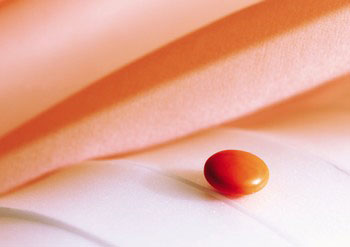The supply of genuinely new drugs has just about dried up. No wonder pharmaceutical companies are so keen to protect their patents on existing drugs - The Business - Column.
 The pharmaceutical business was once run by men and women in white coats. Heroic figures, they peered into test tubes and Petri dishes, made startling discoveries, produced the necessary pills and saved lives. Or so it seemed, anyway. The pharmaceutical business was once run by men and women in white coats. Heroic figures, they peered into test tubes and Petri dishes, made startling discoveries, produced the necessary pills and saved lives. Or so it seemed, anyway.
These days the industry seems to rely on lawyers wielding weaselly arguments and marketing people packaging drugs in ever-more-fancy clothes. The coups are achieved not in the labs, but in the courts and the advertising agencies.
Any contrivance that can extend the monopoly position of a drug is eagerly seized upon. Competitors who legitimately produce copycat versions after the expiry of the standard 20-year patent are the foe. They are fought as energetically as any bug or cancer.
This is understandable. It typically takes 12 years to bring a new treatment to market and costs up to a billion dollars. Investors who have bankrolled the R&D want a return in the eight years before the market is flooded with cheap copycat products.
When manufacturers lose patent battles, the results are ugly: [pounds sterling]18bn has been wiped from the value of GlaxoSmithKline, Britain's biggest drug company, in the few weeks since patents on its antibiotic Augmentin were invalidated by a Virginia judge. Everyone in the industry points to Prozac. The patent on the anti-depressant expired last year and within three months, sales had fallen by 70 per cent as the generic drugmakers piled in with copycat versions at a fraction of the price.
The need to nurture existing products has rarely been so extreme. For a reason nobody seems able to give, the flow of new treatments is drying up. The US Food and Drug Administration has received just two applications for final approval of genuinely new drugs this year -- an amazingly low figure.
But the tactics used to defend drugs are beginning to look a bit murky. Some companies may even have resorted to old-fashioned bungs. An investigation by the US Federal Trade Commission found evidence that one big drug group, Abbott Laboratories, agreed to pay a rival, Geneva Pharmaceuticals, $4.5M a month to delay marketing a cheap version of Abbott's hypertension treatment. Closer to home, AstraZeneca, the old drugs arm of ICI, is accused of using questionable techniques to defend its highly profitable ulcer drug Losec, sales of which exceeded $6bn in 2000.
A secret group of lawyers, salesmen and scientists was set up seven years ago to plan for the expiry of the Losec patent in 2001. It was called the Shark Fin Project because of the shape the sales graph was expected to make when the patent ended, according to an investigation by the Wall Street Journal.
The group began with the best of intentions -- to produce a new medication better than Losec. But the successor pill, Nexium, is scarcely any different and scarcely any better, though the active molecule has been tweaked sufficiently to justify a new patent.
So all AstraZeneca's considerable talents have gone into legal wrinkles to extend the patents on Losec and into various forms of puffery to boost Nexium. Fifteen months after the patent expired, not a single copycat of Losec has reached the pharmacy shelves. That means an additional $l0m in sales every day.
AstraZeneca denies it is using delaying tactics. It argues that it is using legitimate means to stop others capitalising on its inventions. What is undeniable is that every drug company has its equivalent of the Shark Fin team and that prescription drug prices are higher than they would otherwise be. And so either health costs go up or patients go without.
In America, where big business foots the bill for healthcare, there is growing anger: General Motors alone spends $1m a week (yes, a week) on Losec for past and present employees covered by its healthcare plan.
Along with a string of Fortune 500 companies, it is pressing Congress for a change in the law that currently stops generic competitors from being launched while there is litigation outstanding. And General Motors is not the sort of customer anyone would want as an enemy.
If it looks too good to be true, it is too good to be true. Abbey National has shown that it learnt nothing from the Barings collapse. At Barings, a supposed star (Nick Leeson) was making so much money for the bank that nobody wanted to inquire too carefully as to how.
At the Abbey, another supposed star (Gareth Jones, head of treasury) also made big profits and again few questions were asked. Any suggestion - by sniffy sceptics like me -- that he must be taking big risks was emphatically denied.
The cost so far? About [pounds sterling]650m in losses, write-offs and provisions over two years, which will have to be shouldered by the Abbey's two million small shareholders. There was one difference: while Leeson went to jail, Jones, who did nothing illegal, walked off with a [pounds sterling]1.8m pay-off. |